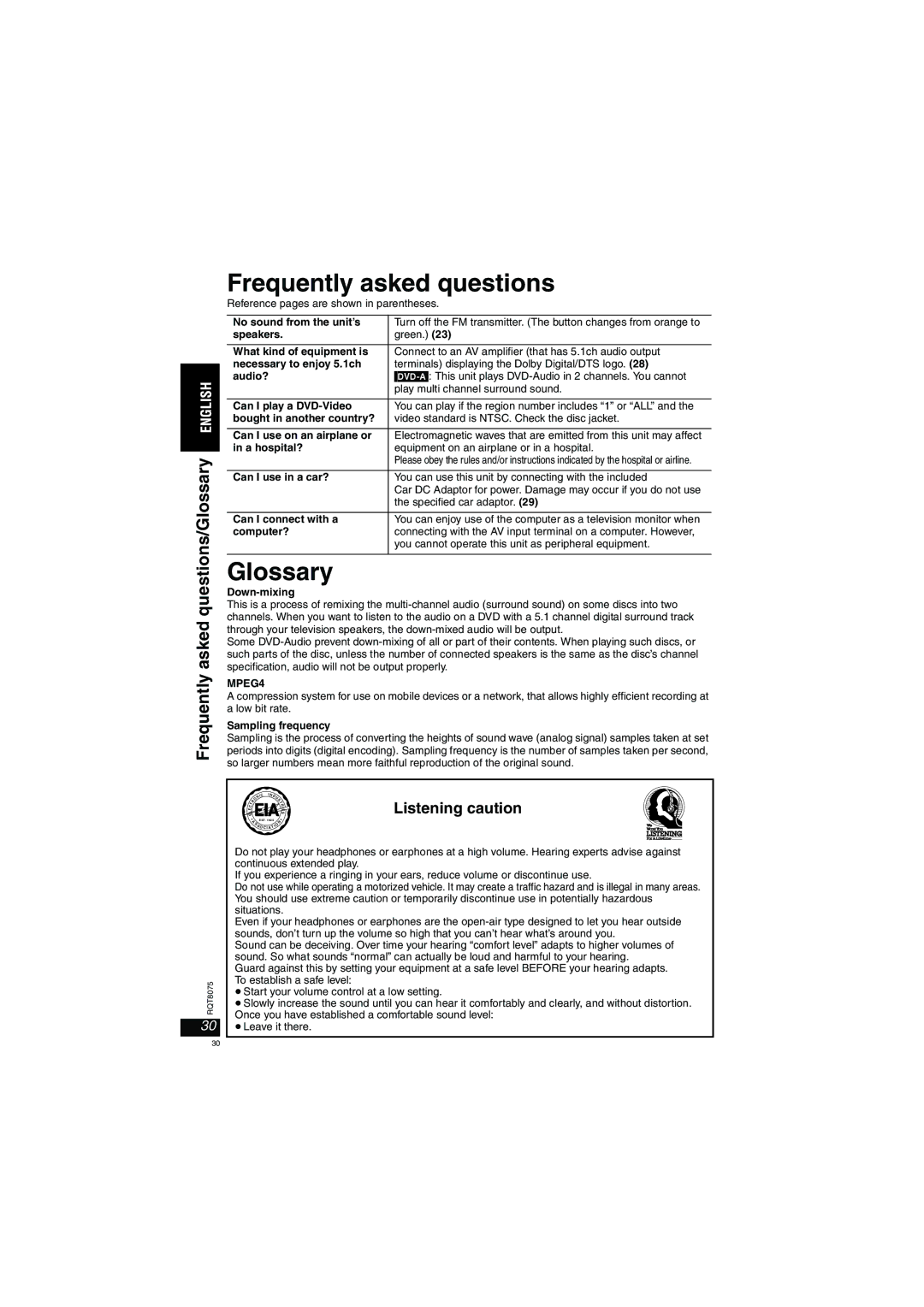
Frequently asked questions/Glossary
Frequently asked questions
Reference pages are shown in parentheses.
No sound from the unit’s | Turn off the FM transmitter. (The button changes from orange to |
speakers. | green.) (23) |
|
|
What kind of equipment is | Connect to an AV amplifier (that has 5.1ch audio output |
necessary to enjoy 5.1ch | terminals) displaying the Dolby Digital/DTS logo. (28) |
audio? | |
| play multi channel surround sound. |
|
|
Can I play a | You can play if the region number includes “1” or “ALL” and the |
bought in another country? | video standard is NTSC. Check the disc jacket. |
|
|
Can I use on an airplane or | Electromagnetic waves that are emitted from this unit may affect |
in a hospital? | equipment on an airplane or in a hospital. |
| Please obey the rules and/or instructions indicated by the hospital or airline. |
|
|
Can I use in a car? | You can use this unit by connecting with the included |
| Car DC Adaptor for power. Damage may occur if you do not use |
| the specified car adaptor. (29) |
|
|
Can I connect with a | You can enjoy use of the computer as a television monitor when |
computer? | connecting with the AV input terminal on a computer. However, |
| you cannot operate this unit as peripheral equipment. |
|
|
Glossary
Down-mixing
This is a process of remixing the
Some
MPEG4
A compression system for use on mobile devices or a network, that allows highly efficient recording at a low bit rate.
Sampling frequency
Sampling is the process of converting the heights of sound wave (analog signal) samples taken at set periods into digits (digital encoding). Sampling frequency is the number of samples taken per second, so larger numbers mean more faithful reproduction of the original sound.
RQT8075
30
|
|
| IC I N | DU |
|
|
| ||
|
| N |
|
|
|
|
| ||
| R | O |
|
|
| S | Listening caution | ||
|
|
|
|
|
| T | |||
E |
|
|
|
|
|
|
| S | |
T |
|
|
|
|
|
|
| R |
|
C |
|
|
|
|
|
|
| I |
|
E |
|
|
|
|
|
|
| E |
|
L |
|
|
|
|
|
|
|
|
|
• |
|
| EST. 1924 |
| • |
| |||
A |
| N |
| ||||||
|
| S | S |
|
| IO |
|
| |
|
|
|
| O C IAT |
|
|
| ||
Do not play your headphones or earphones at a high volume. Hearing experts advise against continuous extended play.
If you experience a ringing in your ears, reduce volume or discontinue use.
Do not use while operating a motorized vehicle. It may create a traffic hazard and is illegal in many areas. You should use extreme caution or temporarily discontinue use in potentially hazardous situations.
Even if your headphones or earphones are the
Sound can be deceiving. Over time your hearing “comfort level” adapts to higher volumes of sound. So what sounds “normal” can actually be loud and harmful to your hearing.
Guard against this by setting your equipment at a safe level BEFORE your hearing adapts. To establish a safe level:
≥Start your volume control at a low setting.
≥Slowly increase the sound until you can hear it comfortably and clearly, and without distortion. Once you have established a comfortable sound level:
≥Leave it there.
30
